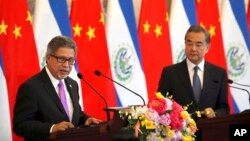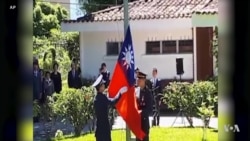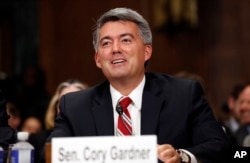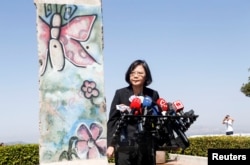The Trump administration says it is re-examining relations with El Salvador after the Central American nation broke diplomatic ties with Taiwan in favor of China. In a statement, the White House criticized the country's decision as well as Beijing's diplomatic outreach that led to the move.
“The El Salvadoran government’s receptiveness to China’s apparent interference in the domestic politics of a Western Hemisphere country is of grave concern to the United States, and will result in a re-evaluation of our relationship with El Salvador,” said the White House statement published late Thursday.
WATCH: US Blasts El Salvador for Cutting Ties with Taiwan in Favor of China
The administration's statement is seen as the toughest so far in response to China’s campaign to isolate Taiwan, and analysts say it is meant to send a message.
It appears this El Salvador case is “a wake-up call for the United States” and provoked the strongest response that seems to aim at deterring other countries from doing the same, particularly in the U.S. backyard, said Bonnie Glaser, director of the China Power Project at Center for International and Strategic Studies.
State Department officials said they plan to convey a clear message to governments in the region, including Honduras and Nicaragua, that switching diplomatic ties to China would harm their relationship with the United States.
On Friday, in a Tweet, Republican Senator Marco Rubio (R-Fla) said El Salvador “will soon find out” about the repercussions.
Rubio had spoken with U.S. President Donald Trump about ending American aid to El Salvador. Rubio and fellow Republican Senator Cory Gardner (R-Colo.) plan legislation that could downgrade relations or suspend foreign aid to discourage other nations from cutting ties with Taiwan.
El Salvador is the third nation to abandon Taiwan for China this year, following the Dominican Republic, and the West African nation of Burkina Faso. That leaves 17 countries that recognize Taiwan as a sovereign nation and, as a result, do not have formal diplomatic relations with China. The United States has maintained unofficial relations with Taiwan since it established formal ties with China in 1979.
Friday, China’s Ministry of Foreign Affairs pushed back on the U.S. criticism, saying Washington is interfering in El Salvador’s internal affairs.
“As far as China, we believe Latin America and the Caribbean Area is an important force of independent and rapid growth in multipolarization and economic globalization. We advise the certain people to respect other countries' rights in making independent decisions on internal and foreign affairs, and stop the actions of hegemony,” said spokesperson Lu Kang.
Sharp words from White House
In the past, when countries switched diplomatic relations from Taiwan to China, the United States States had refrained from blunt language.
On June 13, 2017, State Department spokesperson Heather Nauert referred to Panama’s decision to switch diplomatic ties from Taiwan to China as “an internal matter” between the governments of Taiwan and Panama.
The White House statement indicates the U.S. is now shifting that stance.
“The United States will continue to oppose China’s destabilization of the cross-Strait relationship and political interference in the Western Hemisphere,” said the White House.
The sharp criticism reflects Washington’s increasing dismay with Beijing’s actions to further isolate Taiwan, rather than find a way forward in dialogue, according to experts.Many observers also see Washington adopting a more confrontational stance toward Beijing.
“I think this does represent a tougher stance by the Trump Administration toward China's behavior in the emerging world as it seeks to use its economic clout to extend its influence and advance its diplomatic agenda,” Dennis Wilder from Georgetown University's U.S.-China Initiative told VOA on Friday.
Others pointed out there is broad consensus in the White House that America’s strategic posture towards China is changing on all fronts, with Beijing increasingly viewed as an adversary.
Harry Kazianis, director of defense studies at the Center for the National Interest in Washington, told VOA that under such thinking “a shift towards helping Taiwan in a much more open way was inevitable. A first step in doing so would be reacting the way the administration did in its tough statement on El Salvador.
“Considering Taiwan is a strong democracy that respects the rule of law and human rights, Taipei is deserving of that. China should know this administration thinks of Taiwan very differently — and should be cautious in its actions,” Kazianis added.
China has ramped up its campaign to isolate Taiwan diplomatically since Taiwanese president Tsai Ing-wen was elected in 2016, succeeding a more pro-Beijing leader.
Tsai vowed not cave to pressure following El Salvador’s diplomatic switch on Tuesday, saying Taiwan is more determined to preserve its self-rule.
A State Department official told VOA China’s efforts to unilaterally alter the status quo are “harmful” and do not contribute to regional stability.
“Consistent with the Taiwan Relations Act, the United States considers any effort to determine the future of Taiwan by other than peaceful means, including by boycotts or embargoes, of grave concern to the United States,” said the official.








